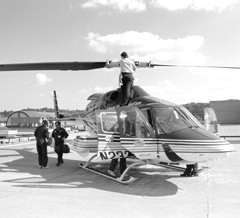The University Record, November 8, 1999 By Kara Gavin
Medical Center Public Relations

Soaring above their peers like their helicopters and airplanes soar above Michigan, the Health System’s Survival Flight was named the best air medical program in the country last week.
The award, given in Nashville at the annual convention of the Association of Air Medical Services, recognizes Survival Flight’s excellence in patient care, leadership, safety, innovation, ingenuity and community service.
There are more than 250 other air ambulance programs in the United States. U-M’s 16-year-old program makes over 1,300 flights each year, traveling more than 200,000 miles to bring patients and transplant organs to and from the U-M hospitals and other healthcare facilities. In all, its staff has been involved in the care and transport of nearly 20,000 patients, from critically ill newborns to accident victims to transplant candidates.
“All of us at Survival Flight—from pilots, flight nurses and doctors in the air to dispatchers, communications experts, maintenance crews and Emergency Room staff on the ground—take great pride in this recognition,” says Medical Director Mark Lowell.
Survival Flight’s skilled staff and advanced aircraft are on call 24 hours a day, 365 days a year to travel to hospitals, accident scenes and disaster sites.
Three twin-engine helicopters, each equipped with state-of-the-art medical equipment, fly in and out of helipads atop University Hospital and C.S. Mott Children’s Hospital. A Cessna Citation fixed-wing jet airplane, capable of transporting patients from the entire continental U.S., Canada and Mexico, is stationed at Willow Run Airport. Also on call is an ambulance outfitted to transport neonatal and pediatric patients.
Within minutes of receiving a call for helicopter assistance—or within two hours for a fixed-wing airplane trip—they can be on their way to transport patients or transplant teams, armed with specialized equipment and medical staff if needed.
“As a surgeon, I treat many patients who have been transported by Survival Flight, and I know how intensely grateful they are for the speed and quality of the team’s service during a critical time in their care,” says Lloyd Jacobs, professor of surgery and chief operating officer, Health System. “So as an administrator, I am doubly proud to congratulate this fine team on this national recognition of their achievements.”

